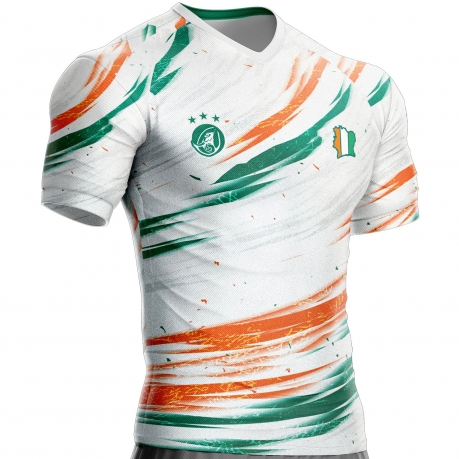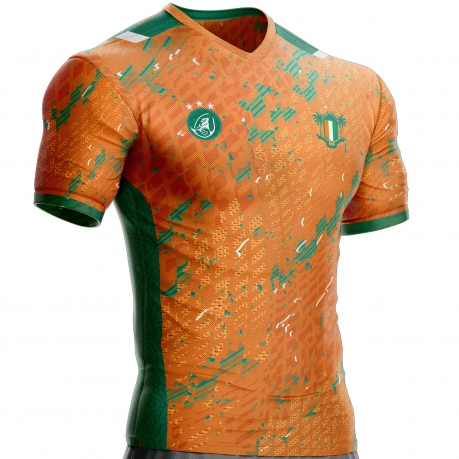Ivory Coast VS Mali: the football match of the century!

An electric duel: Ivory Coast vs Mali
On February 12, 2013, the Bouaké stadium in Côte d'Ivoire vibrates with electric fervor. The Elephants face the Eagles of Mali in a crucial match for World Cup qualification. The score is close, the stakes are immense. In the 89th minute, Gervinho, the Ivorian star striker, dribbled past the Malian defense and scored an epic goal. The stadium explodes with joy, Ivory Coast is on top of the world.
This match is just one chapter in the legendary rivalry between the two nations on the football field.
In this article, we will explore the origins of this passion, the ingredients that fuel this thrilling derby and the emotions that are unleashed during these encounters.
As a backdrop, the importance of football in West Africa and the geographical proximity between Ivory Coast and Mali will weave the fabric of this story.
So, fasten your seat belts and prepare to dive into the ruthless and fascinating world of the Ivory Coast-Mali rivalry.
The roots of a passion
The history of football in Ivory Coast and Mali is closely linked to the rivalry that drives them.
From the 1960s, the two nations distinguished themselves on the continental scene. Ivory Coast, with its legends like Laurent Pokou and Didier Drogba, won the African Cup of Nations in 1992 and 2015. Mali, although never having won the supreme title, asserts itself as a formidable force with talented players like Salif Keïta and Seydou Keïta.
Over the years, epic confrontations have left their mark. In 2008, the Elephants won against the Eagles in the semi-final of the CAN, depriving them of a historic final. In 2013, the qualifying match for the World Cup, punctuated by Gervinho's goal, remains engraved in the memory of Ivorian supporters.
More than a simple sporting rivalry, this duel is a question of national pride and regional supremacy.
The geographic and cultural proximity between the two countries reinforces the intensity of the rivalry. Supporters of both teams mobilize en masse to support their colors, creating an electric atmosphere during matches.
Each team's unique style of play also fuels the rivalry. Ivory Coast is known for its offensive and flamboyant play, while Mali favors a more technical and disciplined style.
Iconic figures embody this rivalry. Didier Drogba for Ivory Coast and Seydou Keïta for Mali symbolize the passion and talent that drive the two nations.
The impact of this rivalry goes far beyond the field.
The enthusiasm of supporters is immense, generating significant media coverage and a significant economic impact (TV rights, sponsorship).
However, this rivalry is not without tensions.
Fan fervor can sometimes turn into violence, underscoring the need to maintain fair play and mutual respect.
In conclusion, the rivalry between Ivory Coast and Mali is a source of inspiration and passion for football lovers.
It represents the very essence of sport: surpassing oneself, national pride and the hope of victory.
The legacy of the duel
To conclude this exploration of the Ivory Coast-Mali rivalry, it is worth considering its legacy and its impact on the future.
This rivalry has undeniably contributed to the growth of football in West Africa. It pushed both nations to surpass themselves, to develop strategies and to train talented players. The performances of Côte d'Ivoire and Mali on the continental and international scene are proof of this.
This overflowing passion is passed down from generation to generation. Young Ivorian and Malian footballers grow up idolizing the heroes of past confrontations. This rivalry thus plays an important role in preserving the region's footballing heritage.
However, it is important not to overlook the potential negative aspects. Excessive fervor can sometimes spill over into violence and tensions between supporters. It is essential to promote fair play and mutual respect so that this sporting rivalry remains a source of positive inspiration.
Ultimately, the Ivory Coast-Mali rivalry is an inseparable element of the West African football landscape. It is both a source of passion, a driver of sporting development and a symbol of national pride.
So, who will win in the next duel? Only the determination of the players and the vibrant support of the supporters will decide. One thing is certain, this shock promises a new page of history in the exciting saga of the Ivory Coast-Mali rivalry.
Concrete illustrations of rivalry
To illustrate the depth of this rivalry, let's dive into some real-life examples of thrilling matches.
On February 12, 2013 , during the qualifying match for the World Cup, Gervinho scored an unforgettable goal for Ivory Coast. This goal, synonymous with victory and qualification, triggered an explosion of joy in the stadium and throughout the country.
In 2008 , the Elephants dominated the Eagles in the semi-final of the CAN (3-0). A match marked by the offensive power of Ivory Coast and the disappointment of Malian supporters.
During CAN 2015 , the two teams found themselves in the group stage. The match ended in a draw (1-1), illustrating the balance of forces and the intensity of the rivalry.
Anecdotes and quotes also fuel the legend.
Didier Drogba said: "The match against Mali is always a special match. There is a great rivalry between the two teams, and it is always a very competitive match."
Seydou Keïta said: "Côte d'Ivoire and Mali are two great footballing nations. When we play against each other, it's always a game apart."
Statistics underline the importance of this rivalry.
In the last 10 matches played between the two teams, Ivory Coast won 6, Mali 2 and 2 matches ended in a draw.
Images and videos capture the essence of this rivalry.
The joy of the supporters after a victorious goal, the tears of disappointment after a defeat, the intensity of the duels on the field... all these elements contribute to the legend of the Ivory Coast-Mali rivalry.
In conclusion, the concrete examples illustrate the depth and complexity of this rivalry.
More than just a sporting opposition, it is a source of inspiration, passion and emotions for football lovers in West Africa and around the world.
Nuances and future prospects
It is important to emphasize that the Ivory Coast-Mali rivalry cannot be reduced to a simple binary opposition.
Beyond the fervor and tensions, there is a mutual respect and sportsmanship that brings honor to football. The players from both teams know each other and often like each other.
Furthermore, it is necessary to analyze the evolution of this rivalry over time.
Some observers say it has intensified in recent years, while others believe it has calmed with the emergence of new generations of players.
A question then arises: what is the future of this sporting rivalry?
Several factors will influence its evolution:
The performances of the two teams on the international scene
The emergence of new talents
Managing tensions between supporters
It is impossible to predict the future of this rivalry with certainty.
However, one thing is certain: it will continue to fascinate and excite football lovers in West Africa and around the world.
To fuel the discussion, here are some questions we can ask ourselves:
Is the Ivory Coast-Mali rivalry beneficial for the development of football in the region?
How can we promote fair play and mutual respect between supporters of the two teams?
What lessons can we learn from this sporting rivalry?
In conclusion, the Ivory Coast-Mali rivalry is a complex and fascinating phenomenon that deserves to be analyzed and understood.
She is a source of inspiration, passion and emotions for football lovers.
It is up to us to ensure that this sporting rivalry remains a positive force for the development of football in West Africa.
In conclusion, the rivalry between Ivory Coast and Mali is a driving force in West African football.
It is a source of inspiration, passion and emotions for supporters of both teams and for football lovers in general.
This rivalry is born from a common history, geographical proximity and a shared passion for football.
It has been nourished over the years by epic confrontations, moments of glory and disappointment.
Today, the Ivory Coast-Mali rivalry is an inseparable element of the West African football landscape.
It is a source of motivation for the players, a vibrant spectacle for the supporters and a symbol of national pride for both countries.
So, which team will win in the next duel?
Leave us your comments and share your views on this legendary rivalry!







